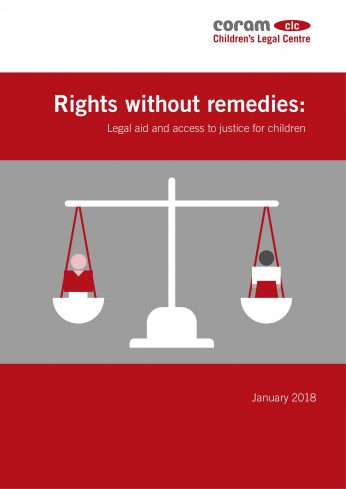 Since the measures in the Legal Aid Sentencing and Punishment of Offenders Act (LASPO) came into force in April 2013, at least 6,000 children each year have been left without access to free legal advice and representation in many areas of civil law – some estimates are as high as 15,000.
Since the measures in the Legal Aid Sentencing and Punishment of Offenders Act (LASPO) came into force in April 2013, at least 6,000 children each year have been left without access to free legal advice and representation in many areas of civil law – some estimates are as high as 15,000.
However, this figure does not include children in families and much of the impact of LASPO on children is felt in cases involving children, rather than the cases involving child claimants. CCLC provides pro bono advice to more than 10,000 such children every year.
Without funding for legal advice or representation, children have been left without a home, without legal status, excluded from education and separated from their family.
Rights without remedies: legal aid and access to justice for children draws on evidence from CCLC’s legal advice services.
It finds that the removal of most of family, immigration and education law from the scope of legal aid has caused thousands of miscarriages of justice that have led to the breakup of families, the costly and often unlawful exclusion of children from education, and widespread destitution and exploitation among migrant families. Across all of these areas of law, public awareness of people’s rights and legal remedies is low and sometimes actually falling. This is especially true of the government’s intended safety net, the exceptional case funding system, which is in urgent need of reform so that children’s cases are considered in line with child rights standards.
LASPO’s changes were broad, and fundamentally altered the UK’s justice system. As such, the government committed to review the Act within five years of its implementation. Now that this review is underway, we urge the government to examine in particular the impact on children’s rights of the legal aid changes, and to take steps to address this impact through implementing the recommendations in this report. No child should be left without access to justice.
Recommendations include:
- The government’s review of civil legal aid must include a detailed assessment of the impact on children and young people.
- The government should reinstate legal aid in all cases where there is local authority involvement in private law children proceedings, and should be available in all cases in which a child is at risk of abuse.
- Continued funding should be provided for public legal advice on education law issues.
- The government should reinstate legal aid for all unaccompanied migrant children.
- The Legal Aid Agency must reform the exceptional case funding system.